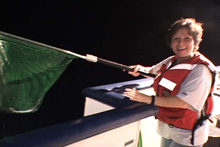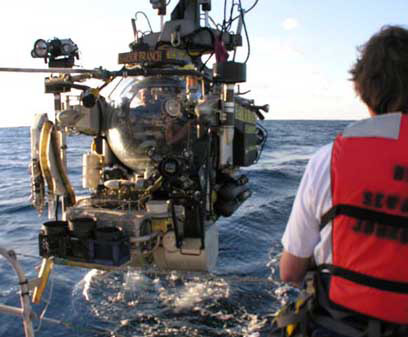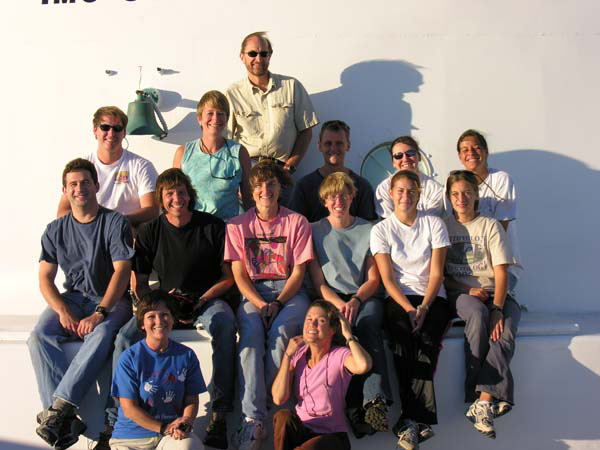Photo & Video Log
This page contains photos and videos taken during the
Life on the Edge 2005 expedition
that took place October 16 - November 1, 2005. Click on any image to view
a larger version and for additional information. If a movie camera icon
 is
present, a QuickTime video can be viewed by clicking on the image. Other
video formats are available on the linked pages. If a Podcast icon
is
present, a QuickTime video can be viewed by clicking on the image. Other
video formats are available on the linked pages. If a Podcast icon  is
present, a video or audio file is available for download or you can subscribe to the RSS Podcast Feed.
is
present, a video or audio file is available for download or you can subscribe to the RSS Podcast Feed. 
If a slideshow icon  is
present, a visual log of exploration images can be viewed. You can scroll
through them one by one, or select the play button for an automatic slideshow.
is
present, a visual log of exploration images can be viewed. You can scroll
through them one by one, or select the play button for an automatic slideshow.
(HR) = "High Resolution" images available.
 Video & Slideshows
Video & Slideshows


 Summary
Summary
Known for hundreds of years yet, Deep-sea or cold water corals have been poorly studied. (QuickTime, 2.8 Mb)

 Summary
Summary
Images of the R/V Seward Johnson & Johnson-Sea-Link submersible taken during the Life on the Edge Exploration. (HR)

 October 29
October 29
View a visual collection of images from the Life on the Edge 2005 Expedition.

 October 19
October 19
Animated flyover of a Cape Lookout deep coral site with data from several previous submersible tracks. (QuickTime, 2.2 Mb)

 October 16
October 16
The first Neuston net sample was collected off Cape Loookout, NC, in an area extensively studied in the past. (QuickTime, 1.1 Mb)
Images

November 1
The habitat at the morning dive at north Jacksonville was a diverse mixed habitat.

November 1
The dive track from the afternoon dive crossed three different habitat types.

October 31
The sargassumfish, Histrio histrio, spends its entire life in the Sargassum.

October 31
Commercially important dolphinfish, Coryphaena hippurus, are known to be associated with Sargassum.

October 31
A common predator that occurs on deep coral banks is Helicolenus dactylopterus (blackbelly rosefish).

October 31
Three common mesopelagic fishes have been observed in dense aggregations near deep coral banks.

October 30
The drawing of Nezumia sclerorhynchus (roughtip grenadier) was from a paper by Marshall in 1973. (HR)

October 30
A roughtip grenadier specimen photographed during a cruise dive. (HR)

October 30
Indirect sampling usually produces specimens that arrive on deck in very poor condition.

October 30
Two years of ship tracks plotted over the Cape Fear deep coral bank area off North Carolina, illustrating dense coverage of single beam sonar. (HR)

October 28
Examples of bottom habitat observed during the morning dive at Stetson Banks.

October 28
Examples of bottom habitat observed during the afternoon dive at Stetson Banks.

October 27
Dr. Ross (on the right, in sunglasses) teaches an impromptu knot-tying class. (HR)

October 27
Sample of consolidated substrate collected at the Savannah banks. (HR)

October 26
Dr. Steve Ross is interviewed by visitors from the media. (HR)

October 26
A standard 8.5-ounce styrofoam cup compared with a cup, originally the same size. (HR)

October 24
Elementary educator Reneé Green participating in nightlighting operations. (HR)

October 24
Reneé Green and a specimen of halfbeak she caught during a nightlighting session.

October 23
A small fraction of the data being collected on this expedition. (HR)

October 23
Andrea Quattrini monitors sonar data while the team assesses a potential dive site. (HR)

October 22
The Night Crew: (left to right) Jennie McCLain, Tara Casazza (watch chief), Barb Lubinski and Reneé Green. (HR)

October 22
Juvenile Sailfish (Istiophurus platypterus) specimens caught with Neuston net. (HR)

October 21
Jennie McClain immediately after the halfbeak she caught slipped through the net mesh and back into the water.

October 21
Halfbeak (Hemiramphus balao) caught by dip net during nightlighting session.

October 20
Dr. Murray Roberts prepares to enter the stern compartment of the Johnson-Sea-Link submersible.

October 20
Frame grab from external bow video camera: dense coral development of mostly live Lophelia. (HR)

October 20
The VICTOR ROV (Remotely Operated Vehicle), (Ifremer, France) being deployed from the R/V POLARSTERN. (HR)

October 19
Map generated using ArcMap software giving an overview of the 2004 expedition cruise plan.

October 19
Screen capture of an ArcMap scene containing several layers of data.

October 19
Example of a three-dimensional depiction of changes in habitat over the course of a single submersible dive track.

October 19
Screen capture of the 3-D mapping program, ArcScene.

October 18
The sub's manipulator arm collecting a crab trap containing five Galatheid crabs. (HR)

October 18
Cheryl Morrison shows a specimen of hermit crab she collected during her dive. (HR)

October 18
A species of hermit crab residing in a worm tube. (HR)

October 17
Deployment of the Johnson Sea-Link submersible for the first dive of Life on the Edge 2005.

October 17
Chaunax sp. This is a species of the fish family known as gapers. (HR)

October 17
We have observed the bignose shark swimming around the coral banks on several occasions.

October 16
The R/V SEWARD JOHNSON docked at Morehead City, NC. (HR)

October 16
Dr. Ross and his student Jennie McClain. (HR)

October 16
Melissa Partyka fabricating experimental fish trap. (HR)

October 16
Group photo of science team. (HR)

October 16
Examining the first Neuston net sample. (HR)

October 16
Tara Casazza examining specimen of eel larvae obtained via Neuston net. (HR)
![]() is
present, a QuickTime video can be viewed by clicking on the image. Other
video formats are available on the linked pages. If a Podcast icon
is
present, a QuickTime video can be viewed by clicking on the image. Other
video formats are available on the linked pages. If a Podcast icon ![]() is
present, a video or audio file is available for download or you can subscribe to the RSS Podcast Feed.
is
present, a video or audio file is available for download or you can subscribe to the RSS Podcast Feed. ![]()
![]() is
present, a visual log of exploration images can be viewed. You can scroll
through them one by one, or select the play button for an automatic slideshow.
is
present, a visual log of exploration images can be viewed. You can scroll
through them one by one, or select the play button for an automatic slideshow. Video & Slideshows
Video & Slideshows![]()
![]() Summary
Summary![]() Summary
Summary![]() October 16
October 16








































































